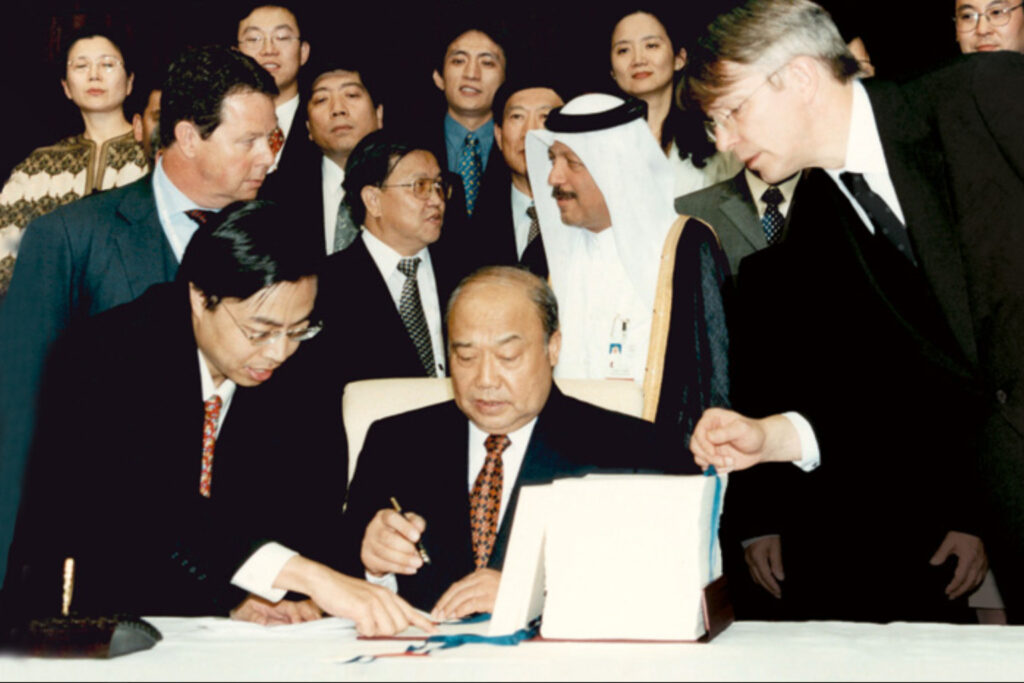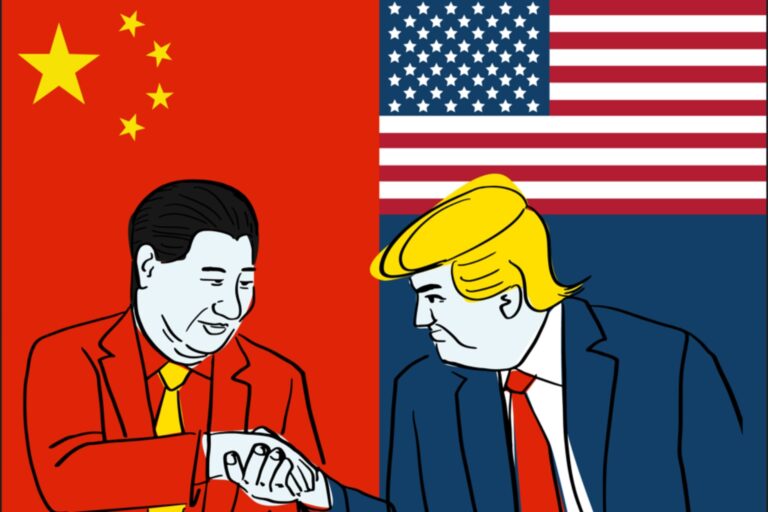In the 1980s, a growing amicability in US-China economic relations began to emerge despite ongoing political tensions. Policymakers in both countries concentrated their efforts on formalizing trade relations, with the declaration of China’s Most Favored Nation status in the 1990s being a notable milestone.[1] The apex of collaboration, however, was China’s 2001 accession to the World Trade Organization (WTO), marking a pivotal moment in which the once-isolated country was integrated into the depths of global connectivity. Although initially celebrated as a diplomatic triumph, this moment soon became subject to scrutiny and debate within political and academic arenas. A central question has arisen from the discourse: whether the incorporation of China into the WTO—and the support it enjoyed from US policymakers—should be looked upon, in retrospect, with approval or regret.
A considerable portion of policymakers in the United States were largely unfettered in championing the advantages of China’s entry into the WTO. They contended that, to abide by the standards of the organization, China would be compelled to institute liberalizing reforms such as privatization and the lowering of export barriers. This economic restructuring was anticipated to provide American manufacturers and investors freer entry into China’s vast market.[2] Although acknowledging that the reduction of trade barriers would likely lead to increased competition from Chinese imports, US policymakers remained confident that “the dynamic US economy would generate new employment opportunities on net,” thereby mitigating potential losses.[3] With this positive outlook prevailing, the envisioned “democratization” of China and its assimilation into a US-dominated global economy appeared imminent.[4]
In the initial aftermath of China’s WTO accession, the outcome seemed to align with the expectations of US decision-makers, thus validating their support. China undertook predicted liberalizing reforms, evident in the substantial growth of the “private sector share of industrial value added,” which surged from “15 percent in 1998 to 63 percent in 2007.”[5] Moreover, the accession stimulated trade by securing China’s access to US markets and its Most Favored Nation status, effectively encouraging Chinese firms to invest in exporting to ever-demanding American consumers.[6] Households in the United States directly reaped the benefits of this enhanced trade relationship, enjoying “considerable consumer price reductions.”[7]
The coupling of trade and finance between the countries not only facilitated economic gains but also raised the stakes of potential political and military conflicts, which now have more relevant potential to jeopardize the stability of mutual economic interests. As expressed by Kuk et al. (2018) in discussing the expansion of China’s economic influence in the United States, this dynamic perhaps explains the relatively less contentious nature of US-China relations during and directly following the latter’s entry into the WTO.[8] Moments of tension like the 1999 bombing of China’s Belgrade embassy or the 2001 Hainan Island incident, for instance, might have been handled with far less restraint if not for the deepening economic interconnection between the two countries.[9]
A lingering question remains, then, of how this auspicious prospect of cooperation, liberalization, and deterred conflict offered by China’s WTO membership in the early 2000s has deteriorated into the current climate of retroactive regret, accusations branding China as a revisionist power, and mutual hostility. This transformation can be summarized in three key categories: (1) inevitability, (2) inopportune timing, and (3) a sense of perceived insecurity.
The WTO-mandated liberalizing reforms inevitably aided in propelling the growth of China’s economy. The facilitation of free trade afforded Chinese manufacturers greater access to imported intermediate goods, substantially elevating productivity.[10] China’s economic growth was further augmented through the trade surplus it developed with the United States, as US exports to China lagged behind the importation of Chinese goods. This boom for China, however, coincided with escalating resentment among US industries, which grappled with the repercussions of import competition, ensuing wage reductions, and unemployment.[11] Along with the unemployment that persists in regions hit by the “China trade shock,” the ramifications of China’s WTO accession in the United States were compounded when manufacturers began outsourcing production to China, drawn by the allure of cheaper labor.[12] The initial assumptions of policymakers, which anticipated that the US economy had enough fluidity between sectors to adjust to Chinese competition, had been proven overly optimistic.
The challenges emanating from China’s WTO accession were amplified—at least in perception—by the inopportune timing of the Global Financial Crisis. In considering the friction between American and Chinese industries, Minghao Zhao (2019) describes the Crisis as a turning point which would “define increasingly complex US-China relations” as a delicate interplay between “competition and cooperation.”[13] The roots of the Global Financial Crisis stem from the 2008 crash of the United States economy, marked by soaring unemployment, a collapsed housing market, and a volatile financial infrastructure. The impact of this crash reverberated beyond US borders, evolving into an international recession. Although the effects of the Crisis were not as detrimental to China relative to countries less insulated from the globalized economy, it nevertheless faced domestic turmoil. Debates swiftly arose regarding debt, currency exchange, and the now far too clear risk of instability posed by fully integrating into the international economy.[14] Consequently, China adopted a more inward-focused approach to economic security, illustrated in part by a significant increase in the quantity of national industrial policies from merely one in 2006 to fifteen by 2011.[15] This shift mirrored protectionist developments in the United States and, as the two countries turned inward with concerns about economic security, suspicions and portrayals of ill-intent arose on both sides.
China viewed its policies of self-reliance, RMB internationalization efforts, and ambitions of creating its own global financial and development sphere as necessary to preserve economic security in a precarious international economy. These initiatives, however, implied a China independent from global connectivity—contradicting the philosophies of the WTO and threatening to enlarge the imbalance in US-China economic relations. In his work on the economic security dilemma present between the United States and China, David Bulman (2020) discusses how the United Sates perceived China’s self-interested policies as evidence of its “revisionist nature” and an “unwillingness” to adhere to “global rules and norms.” This narrative, which permeated among policymakers, was presented to the American public, along with the belief that China’s policies had “weathered the storm” of economic insecurity.[16] As outlined by Bulman (2020), in 2008, 26% of Americans identified China as the world’s leading economic power, a figure that rose to 43% in 2011; concurrently, “unfavorable views toward China grew from 29 % in 2006 to 42 % in 2008 and then to 52 percent by 2013.”[17] This shift in the American perception of China can be attributed to the consequences of the Global Financial Crisis; the unemployment and industrial decline that disseminated across the United States served to solidify the already developing assertion that jobs and production needed to “come back home.”
Of no surprise, tensions were fueled as such sentiments were popularized among decisionmakers and the American public. The United States continued to accuse China of revisionism, arguing that the employment of “state-driven protectionist policies and practices” and advancements in, for instance, the Belt and Road Initiative and the Asian Infrastructure Investment Bank as alternatives to Western-led institutions such as the World Bank and IMF, is evidence of its efforts to challenge the international structure that has defined the 21st century.[18] Alongside verbal condemnation, confrontational policies were pursued, with a prominent example being the tariffs implemented by the Trump Administration in an attempt to offset the US trade deficit—an initiative that had an adverse effect of China responding with retaliatory tariffs, leading to a tense trade war and a furthering of mutual animosity.[19]
China has interpreted the United States’ rhetoric and policy decisions as an effort to curb its assent as a global power, prompting it to expand its own nationalistic strategies such as making the internationalization of the RMB the formal policy of the People’s Bank of China.[20] These actions, in turn, reinforce the American perception of China’s “revisionist nature.”[21] An incessant dilemma has surfaced, summarized best by Bulman (2020): “The perceived gains from mutual cooperation diminished in both countries and insecurity-induced economic policy choices were perceived by the other side as defections.”[22] What is left is an environment marked by instability, competition, and a growing conviction that US policymakers’ hope of China being entirely assimilated into the liberal global economy is futile.[23]
With this foundation—comprehending the initial policy successes of China’s WTO membership, acknowledging the inevitability of Chinese competition, recognizing the unfortunate timing of the Global Financial Crisis, and understanding the economic security dilemma—we can address the core question: Were US policymakers misguided in supporting China’s WTO accession? As per the previous discussion, a definitive “yes” is not supported. As expected, cooperation with China has yielded benefits for US producers and consumers alike, fostering export opportunities and reduced prices, while also establishing interdependence that acts as a deterrent against military confrontation on both sides. However, it is undeniable that policymakers held certain misconceptions, including a naïve belief that Chinese import competition would have limited impact on US industry and that China would automatically adopt a liberal approach to governance and seamlessly integrate into the Western international order. From the US perspective, China’s WTO entry, coupled with the afflictions posed by the Global Financial Crisis, also exacerbated the effects of China’s disproportionate growth as an economic power, ultimately acting as a catalyst for the current environment of heightened hostility.
The evaluation of whether US policymakers were mistaken in advocating for China’s WTO accession is complicated further by a significant degree of ambiguity. Beyond the observable positives and negatives, it is crucial to consider whether relations between China and the United States would be better without China’s WTO membership. The answer to this question remains elusive. To say that China’s WTO accession is the sole reason for it reaching a status of challenging US economic hegemony would be an insensible overstatement; however, without the membership, perhaps its growth would not so heavily have impacted US industries. The hostility between the United States and China conceivably may have been minimized without the competition spurred by China’s WTO status; alternatively, without the economic interdependence that has arisen, there might be little deterrence from warfare.
Emphasizing different dimensions of analysis—positive, negative, or uncertainty—can lead to varied perceptions of China’s WTO membership, ranging from approval to regret or indifference. Although a definitive conclusion may not be made, there are lessons to be derived amidst this complexity. In “Wisdom Without Tears: Statecraft and the Uses of History,” Hal Brands and William Inboden emphasize the “inevitability of unintended consequences” in policymaking, stating that “…foresight can never be perfect; even the most well-conceived, far-sighted strategy engenders consequences that its designers neither expect nor welcome.”[24] As we evaluate the initial motivations behind supporting China’s WTO accession, we should heed Brands and Inboden’s insight to acknowledge both the unforeseen outcomes that emerged, as well as the likelihood that future foreign policy will be equally susceptible to such a fate. In this capricious international environment, policymakers must not disregard the positive impacts of pursuing cooperation, but nonetheless should anticipate that their decisions—particularly those that encompass an underlying desire to influence the behavior of another country—will not only carry benefits, but also unintended consequences that will soon be subject to retrospective analysis. Armed with a nuanced understanding of history’s lessons, foreign policy leaders must navigate the intricacies of the global stage with the wisdom that their choices will have repercussions that may redefine the future of the international order.
References
[1] David H. Autor, David Dorn, and Gordon H. Hanson, “The China Shock: Learning from Labor-Market Adjustment to Large Changes in Trade,” Annual Review of Economics 8 (2016): 213. https://doi.org/10.1146/annurev-economics-080315-015041.
[2] David Bulman, “The Economic Security Dilemma in US-China Relations,” Asian Perspective (2020): 54-55. https://doi.org/10.1353/apr.2021.0013.
[3] Bulman, “The Economic Security,” 55.
[4] Ibid.
[5] Autor, Dorn, Hanson, “The China Shock,” 214; Bulman, “The Economic Security,” 56-57.
[6] Autor, Dorn, Hanson, “The China Shock,” 214.
[7] Bulman, “The Economic Security,” 56.
[8] John Seungmin Kuk, Deborah Seligsohn, and Jiakun Jack Zhang, “From Tiananmen to Outsourcing: The Effect of Rising Import Competition on Congressional Voting Towards China.” Journal of Contemporary China 27, no. 109 (2018):108. https://doi-org.proxy1.library.jhu.edu/10.1080/10670564.2017.1363024.
[9] Bulman, “The Economic Security,” 57.
[10] Autor, Dorn, Hanson, “The China Shock,” 214.
[11] Kuk, Seligsohn, Zhang, “From Tiananmen,” 103.
[12] Autor, Dorn, Hanson, “The China Shock,” 235; Kuk, Seligsohn, Zhang, “From Tiananmen,” 104
[13] Zhao, Minghao, “Is a New Cold War Inevitable? Chinese Perspectives on US-China Strategic Competition,” The Chinese Journal of International Politics 12(3) (2019): 374. https://doi.org/10.1093/cjip/poz010.
[14] Bulman, “The Economic Security,” 55.
[15] Bulman, “The Economic Security,” 55.
[16] Bulman, “The Economic Security,” 57, 62.
[17] Bulman, “The Economic Security,” 58-59.
[18] Bulman, “The Economic Security,” 49.
[19] Bulman, “The Economic Security,” 63.
[20] Bulman, “The Economic Security,” 60-61.
[21] Bulman, “The Economic Security,” 61.
[22] Bulman, “The Economic Security,” 62.
[23] Bulman, “The Economic Security,” 57.
[24] Hal Brands and William Inboden, “Wisdom Without Tears: Statecraft and the Uses of History,” Journal of Strategic Studies 41, no. 7 (2018): 934. https://doi.org/10.1080/01402390.2018.1428797.




